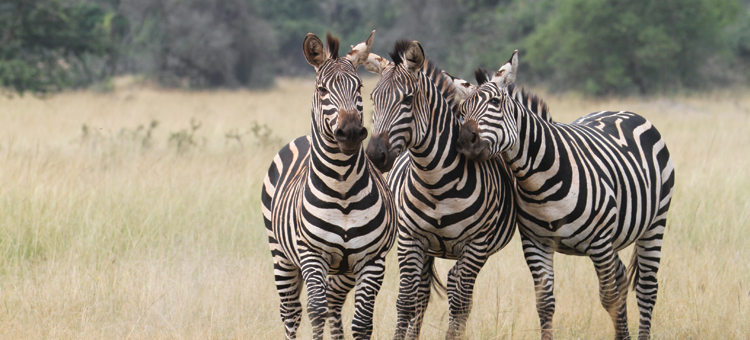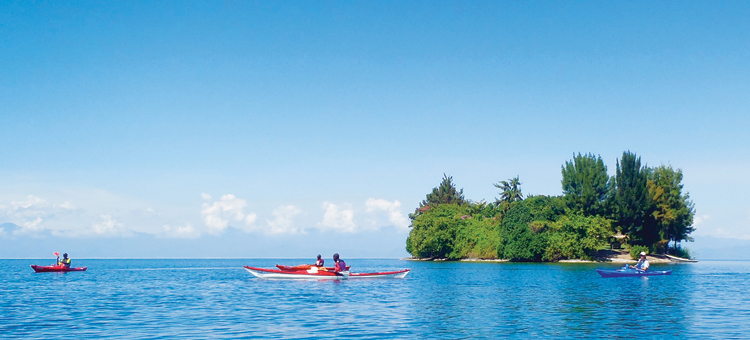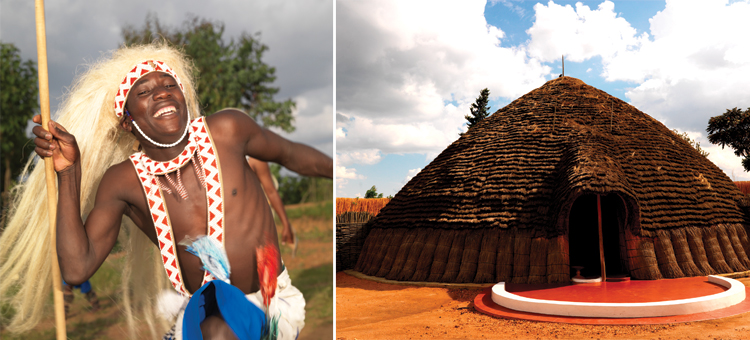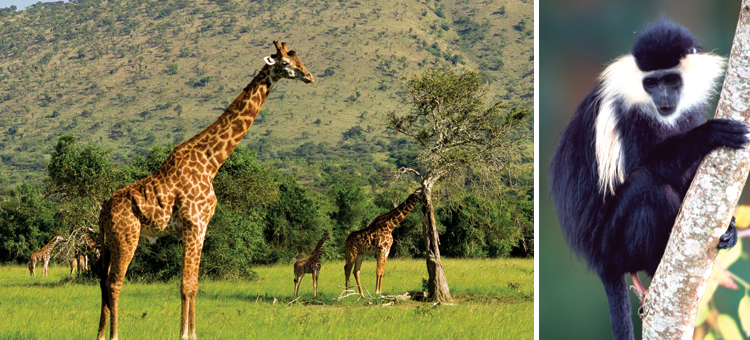Rwanda: Ensconced between Uganda, Tanzania, Burundi and the Democratic Republic of Congo, a few degrees south of the Equator, in the African Great Lakes region, is one of the smallest nations in the African mainland, Rwanda, the land of a thousand hills (Le Pays des Mille Collines).
Mountain Gorilla trekking, one of the most moving wildlife experiences in the world, has been an overwhelming conservation and economic success
Rwanda is a remarkable story of driving reconciliation among various ethnic groups, overcoming a colonial policy of divide and rule, and how a nation has overcome ethnic majoritarianism by concentrating on a shared linguistic and cultural heritage. Tourism is Rwanda’s biggest foreign exchange earner. It earned this African safari destination $404 million in 2016 to compete with coffee. Rwanda Development Board (RDB) projects the tourism sector to generate about $444 million in 2017. Rwanda as a destination offers several attractions, including eco-tourism and nature-based tourism. The key attractions of Rwanda are the National Parks – Volcanoes National Park, Nyungwe National Park and Akagera National Park, and the activities range from Mountain Gorilla trekking to primate experience, game drives, community/culture-based tourism, water sports and many more.
“Rwanda is among only three countries in the world where you can trek to see the majestic mountain gorillas up close, a truly once-in-a-lifetime experience,” says Belise Kariza, Chief Tourism Officer, Rwanda Development Board (RDB).
‘Remarkable Rwanda’ welcomed 9145 visitors from India in 2016, a significant improvement compared to previous years. Rwanda has upped the marketing campaign in India and hopes to receive a total of 12,609 visitors from India in 2018.
In December last year, the country received the largest single Indian tour delegation till date, comprising 25 students, a 15-member women’s cricket team, 46 religious pilgrims, and a 16-member business team. Clarence Fernandes, Chairman of Mumbai-based Rwanda Renaissance, who managed the visit, says, “It was an exciting event for tourism in the country as it helped showcase various tourism products Rwanda can offer. The students attended the National Children’s Summit held in Kigali, the capital of Rwanda, and also took part in a ‘Study Rwanda’ programme, designed on the lines of the ‘Study India’ programme, which schools and colleges in the UK have been organising for the last couple of years. The women’s cricket team played matches with Rwandan women cricketers while the pilgrims headed to Kibeho in Nyaruguru district. Members of the Indian business delegation explored trade, tourism and investment opportunities in the country.”
Similar delegations have travelled to the country in April and September last year when Rwanda started seriously focussing on Indian tourists. All of them flew in directly from Mumbai to Kigali, courtesy RwandAir. Adds Ivan Mugisha, Country Manager (India), RwandAir, “We operate non-stop services four times a week to Mumbai using our Boeing 737-800 fleet which offers state-of-the-art dual class cabin.”
RwandAir connects customers seamlessly to and from most domestic cities through partnerships with other Indian carriers such as Jet Airways and Air India. The young airline has been witnessing a positive trend in the number of uplifted passengers from Mumbai with a registered average load factor of over 75 per cent since it started operations. “We will also be deploying an Airbus A330-300, which is a wide-body aircraft, by May 2018 as part of increasing services on the route,” confirms Mugisha. ‘Remarkable Rwanda’ kick-started their 2018 India roadshow by participating in the recently-concluded OTM 2018 in Mumbai. Last year and in 2018, Rwanda won the Most Promising New Destination Award at OTM.
Starting January this year, visa on arrival has been made applicable for Indian travellers to Rwanda, a move that is expected to increase tourist arrivals from around the globe, including India. The new visa regime simplifies the entire travel process making it easier, faster and more efficient for Indian nationals to access Rwanda. “We expect that number of tourists from India will continue to significantly grow in the course of the year, with the probability of exceeding our target, thanks to the relaxed visa procedure. We believe that offering visa on arrival will also enhance business between Rwanda and India,” adds Kariza.
Sustainable Tourism
Rwanda aims to be the premier ecotourism destination in Africa, and for this reason, the country’s tourism goals are embedded on Sustainable Tourism. The administration has been lauded for its efforts towards Sustainable Tourism development by promoting eco-villages and sustainable real estate construction, sustainable home-stays and wildlife viewing in its national parks, as well as sustainable transportation facilities. The Government of Rwanda has also increased number of protected areas in the country by adding Gishwati-Mukura as the newest National Park.
The annual mountain gorilla baby naming ceremony, kwita izina, is one of the few conservation success stories in the world and it is believed that the endangered animal population has increased due to the Government’s efforts, as a result of which most travellers who visit Rwanda anticipate seeing the mountain gorilla species that live in the Volcanoes National Park.
“Rwanda is a stellar example of Sustainable Tourism and how a destination can safeguard itself from overtourism, one of the key concerns of the industry worldwide” says Abraham John, Executive Chairman, Inspiration Unlimited – Events & More.
In May 2017, RDB announced that the price of gorilla trekking permits (issued to individuals for watching gorillas in the Volcanoes National Park for one hour) will be increased from $750 to $1500 for all visitors with immediate effect. This increase was in line with Rwanda’s high-end tourism strategy of protecting mountain gorillas in their natural habitat. “Mountain gorilla trekking is one of the most moving wildlife experiences in the world. It has been an overwhelming conservation and economic success for Rwanda. Rather than increasing the number of tourists to enhance conservation revenue to help other critical species in this country they have decided to increase the price. This is a sound choice since the gorillas are extremely sensitive to human diseases and increasing the human traffic in the forest would be counter-productive,” says Dr. Mike Cranfield, Co-Director, Mountain Gorilla Veterinary Project (Gorilla Doctors).
The increased income will help improve infrastructure not only in the Volcanoes National Park but in other National Parks as well. The permit price increase will also help the local communities with increased revenue sharing. This will ease the pressure on the Park by reducing the risk posed by threats such as snares set for bush meat that sometimes injure gorillas. These changes along with the proposed buffer zone show sound conservation governance.
In the meantime, 10 per cent of the total tourism revenue is used to fund community projects and boost the local economy. It has been reported that over the last 12 years, more than 400 community projects have been completed, including hospitals, schools, business development centres and water supply systems to facilitate access to clean water, which directly benefit the people living around the Parks.
MICE Tourism
To serve as a regional meetings and conference hub for Central and Eastern Africa, and to enhance Rwanda’s diverse and unique tourism products, Rwanda has invested in high-end MICE infrastructure. This will bring more tourists to the country and generate revenue that contributes significantly to the country’s overall socio-economic development.
‘Remarkable Rwanda’ has the capacity to host large events, serviced by three major infrastructural developments in Kigali city – Kigali Convention Centre and Kigali Conference & Exhibition Village with a capacity of 5000 pax each and Serena Conference Centre with a capacity of 2000. All the above sites which are in close proximity to the airport and city centres offer high quality services.
A number of four to five-star hotel brands support Rwanda’s MICE industry by providing medium and small meeting rooms. Among the top 10 facilities are Radisson Blu, Kigali Marriott, Kigali Serena, Ubumwe Grande Hotel, Park Inn by Radisson, Mille Collines, Lemigo, Umubano Marasa, Gorilla Golf and Golden Tulip. 4G internet connectivity is available in all hotels across the country. These properties together contribute to the accommodation capacity of Kigali, which currently has 7200 rooms out of 9900 rooms available in the entire country.
Rwanda also wants Bollywood films to be shot there, because the authorities have noticed how tourism to New Zealand picked up after Bollywood started shooting films there. But that is another story. This small nation has come a long way since the infamous 1994 genocide which was portrayed with sensitivity in the widely-acclaimed film Hotel Rwanda. Today, it is indeed ‘Remarkable Rwanda’.
PLACES OF INTEREST
Volcanoes National Park: Situated in north-west Rwanda, Volcanoes National Park is home to the endangered mountain gorillas and a rich mosaic of montane ecosystems. The park is named after the chain of dormant volcanoes making up the Virunga Massif – Kalisimbi (the highest at 4507 m), Bisoke with its verdant Crater Lake, Sabyinyo, Gahinga and Muhabura. Within the boundaries of Volcanoes National Park are Buhanga Eco-Park, an ancient forest holding Rwanda’s most intriguing folklore and Musanze Caves, formed 62 million years ago after the last estimated volcanic eruption. Hiking, canoeing, mountain biking and village experiences also offer something for everyone to enjoy.
Nyungwe National Park: A ‘piece of paradise’ found its home inside the remarkable Nyungwe Forest. Within the Great Rift Valley lies Africa’s largest protected mountain rain forest, acclaimed for its rich biodiversity and endemic species. It also showcases the only canopy walk in East Africa (reaching 70 m above the forest floor and spanning 200 m in length). Located in the south-western region of Rwanda, at an elevation of over 1600 m, sounds and sights collaborate to create a magical rainforest. Nyungwe National Park holds the source of Africa’s great rivers, feeding the Nile River in the east and the Congo River in the west, and is known as the most endemic species-rich area in Africa. The Park has diverse ecosystems ranging from rainforest, bamboo, grassland to swamps, and bog habitats. It is home to orchids among 1000 other plant species. Chimpanzees and 12 other primates (including 400-strong troop of the Black and White Colobus monkey), and 75 different species of mammals also habituate inside the Park.
Nyungwe National Park is a birder’s paradise with over 310 species of which 27 are Albertine Rift endemics, including the Ruwenzori Turaco, Ruwenzori Double-collared Sunbird and Grauer’s Swamp Warbler.
Akagera National Park: Akagera National Park is named after the Akagera River that flows along the eastern border and feeds into a labyrinth of lakes of which the largest is Lake Ihema. Founded in 1934, with an area of 2500 sq. km., it is the largest protected wetland in Central Africa and the last remaining refuge for savannah-adapted animals and plants in Rwanda. Akagera National Park is home to the famous Big Five: lions, elephants, buffalos, rhinos and leopards, as well as servals, hyenas, jackals, giraffes, zebras and several antelope species. Elephants congregate around the lakes that are inhabited by more than 800 hippos as well as Africa’s largest freshwater predator, the Nile Crocodile. Tourists can embark on an authentic day or night guided-African safari, or experience forest-fringed lakes on a boat ride in one of the most scenic reserves in Africa. If you are lucky, you may even come across the secretive blue monkey, bush baby or sitatunga swamp-dwelling antelope. Akagera is also a bird watching area with nearly 500 species, including the rare and elusive Shoebill, the Red-faced Barbet and the exquisite Papyrus Gonolek.
Lake Kivu and the Congo-Nile Trail
Part of Africa’s Great Rift Valley, Lake Kivu in the west of Rwanda is surrounded by magnificent mountains and has emerald green waters covering a surface area of 2700 sq. km. It is Rwanda’s largest lake and the sixth largest in Africa. Rubavu is a large town on the northern edge of Lake Kivu, an hour’s drive from Volcanoes National Park and a perfect place to relax after gorilla trekking. Once a colonial resort of repute, Rubavu’s waterfront is lined with fading old mansions, hotels and trendy bars ideal for sundowner cocktails.
From Rubavu in the north, the Congo-Nile Trail extends 227 km offering breathtaking landscapes all the way to Rusizi in the south of Lake Kivu. The trail gently curves back and forth as it weaves through hills and mountains beside the lake with eucalyptus trees lining the road and every inch of the hills seemingly terraced with bananas.
For adventurous travellers, an exciting way to explore Rwanda is a kayaking tour on Lake Kivu, or mountain biking/hiking, one of the six off-beaten path stage of the spectacular Congo Nile Trail.
Rwanda’s ‘unknown’ Credentials
- Africa’s ‘most-desired tourist destination’ as endorsed during the World Travel Awards in Kigali last year. Rwanda was also named among the top 18 best places to visit in 2018 around the globe by CNN Travel
- Visa upon arrival without prior application for all citizens around the world
- Among the cleanest countries in Africa and in the whole world. Rwanda’s ban of plastic bags in 2006 has also greatly impacted the country’s image as a refreshingly trash and plastic bag-free country. In 2008, the capital of Rwanda, Kigali, got the UN Habitat Scroll of Honour Award
- Ranked 9th safest country in the world and first in Africa by the Travel & Tourism Competitiveness Report 2016 of the WEF
- Ranked 3rd in Africa in hosting international association events by International Congress and Convention Association 2017
- The 2017 Global Gender Gap Report has ranked Rwanda as first in Africa and fourth globally in closing the gender gap
- Ranked as the second most competitive economy in Africa by the Africa Competitiveness Report 2017. According to the World Bank’s Doing Business Report, Rwanda is also the second easiest place to do business in Africa
- Ranked first in Africa and ninth globally for the most transparent governance by the Global Competitiveness Report 2017
Best time to visit: December to February; June to September
Travelling to Rwanda:
- RwandAir (Mumbai – Kigali)
- SN Brussels (via Brussels)
- KLM (via Amsterdam)
- Qatar Airways (via Doha)
- Turkish Airlines (via Istanbul)
- Kenya Airways (via Nairobi)
- Ethiopian Airlines (via Addis Ababa)
For more information: www.rwandatourism.com | www.rcb.rw









